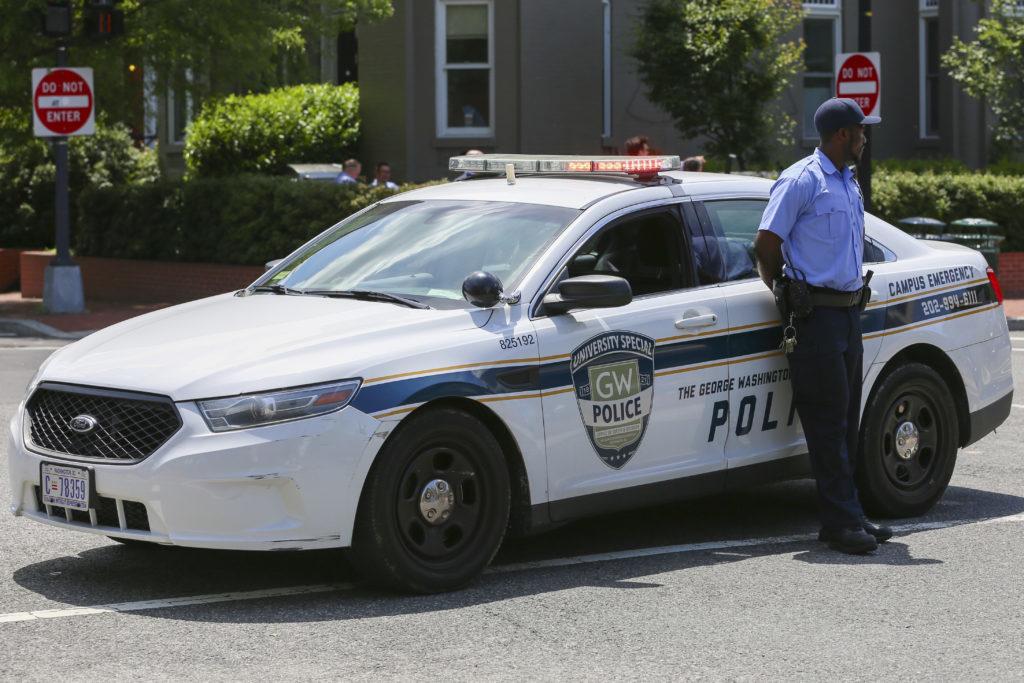University Police Department officers can now respond to emergencies using police sirens after undergoing a special training last summer.
For the first time, UPD officers completed an emergency vehicle operator course, or EVOC, a driver training course designed to teach law enforcement and first responders how to safely navigate their vehicles in emergency situations. Experts said the EVOC training allows officers to respond more quickly and safely to emergencies.
In D.C., departments need EVOC training to use police vehicles to respond, sirens blaring, to emergency scenes, UPD Chief RaShall Brackney said. The District had not designated UPD’s cars as emergency vehicles until this past summer, but now all University vehicles – besides the Segways – have the emergency designation.
All special police officers that have a driver’s license were required to participate in EVOC training once the District offically deemed UPD cars emergency vehicles, Brackney added.
“The training enhances driver safety skills to include heightened abilities to negotiate intersections, navigate heavy vehicular and pedestrian traffic, enhance ability to control their vehicles while also learning to minimize distractions while operating an emergency vehicle,” she said in an email.
The emergency vehicle training will not change how UPD responds at an emergency scene, she said.
“It is an enhancement to our ongoing training programs that enables us to have the most qualified and skilled police force helping to keep our campus community safe,” she said in an email.
Brackney said certification and curriculum standards for the training are set by the U.S. Department of Transportation. She declined to say how many emergency vehicles UPD has and the kinds of emergencies to which the training would be beneficial in responding.
UPD Sgt. Francis Williams said officers took the course when they learned to use Segways, which the department purchased earlier this year. He added that the training was an initiative that Brackney implemented.
“In a life-threatening situation, we can get there a little quicker as opposed to not responding to an emergency,” Williams said in an interview.
One UPD officer, who spoke under the condition of anonymity because officers are not allowed to speak with the media, said while previously officers could only use sirens and lights to block off streets, after the training, UPD can respond to emergencies like any other professional police department.
“If I’m in a car I can just drive there, but if there was something an assault taking place or something like that, we can put on our license sirens and actually respond full force just like any police department would,” he said.
Dave Storton, the lead instructor at the Driving Company, which teaches emergency vehicle response driving, said EVOC helps officers learn to adjust their driving patterns to reflect the severity of the call. For instance, when responding to a murder, officers will drive faster to the scene than if they were heading to the scene of a less violent crime.
“Lights and sirens would help the officers navigate traffic in a safer manner instead of just going there and sitting in traffic,” he said.
For UPD, Storton said lights and sirens would benefit emergency personnel navigating D.C’s congested traffic patterns to prevent vehicles from getting stuck in traffic during emergencies.
Brian Hollo, a retired police captain with Illinois State Police, said from EVOC training, officers master how to manage their vehicles and how to safely drive their cars while speeding to an emergency scene.
“Every case is different,” he said. “It just gives you a whole bunch of things to think about when you’re responding.”
Hollo added that EVOC also trains officers in how to chase suspects and when to end vehicular pursuits that threaten the safety of officers and pedestrians. The training may include a component about pursuits, but UPD officers are not authorized to follow potential criminals off campus.
Previously, UPD officers reported to incidents outside of their jurisdiction, including when an officer followed a car off campus in 2012, before being punished by the city.
Jeff Allison, the director of government and external relations for the International Association of Campus Law Enforcement Administrators, said the specifics of EVOC also depend on the standards of the state or of the department. For D.C, the standards for training are set by the D.C. Police Officers Standards and Training Board, according to MPD’s website.
When hired to the force, MPD officers undergo a series of trainings for 28 weeks, which include emergency vehicle operation, according to the website.
Emergency vehicle training is particularly beneficial on an urban campus because of the high volume of pedestrians, congested streets and numerous red lights, which can slow down officers in an emergency, Allison said.
“It’s really how do we fulfill our mission as a law enforcement agency when it comes to emergency vehicle operations, how do we do that in a safe manner,” he said.





